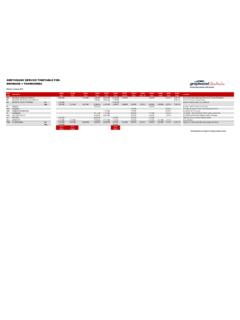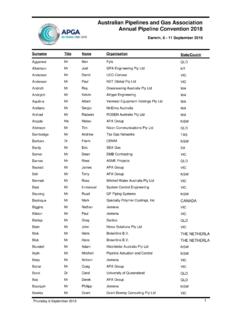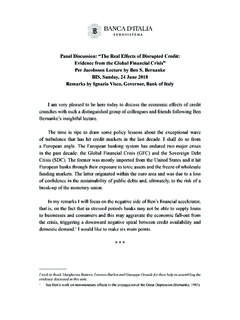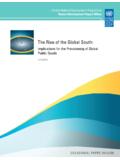Transcription of National General Assembly of Local Government
1 National General Assembly of Local Government Building Tomorrow's Communities 18 - 21 June 2017. Call for Motions Discussion Paper Submitting Motions The National General Assembly of Local Government (NGA) is an important opportunity for you and your council to influence the National policy agenda. To assist you to identify motions that address the theme of the NGA, the Australian Local Government Association (ALGA) Secretariat has prepared this short discussion paper. You are encouraged to read all of the sections of the paper, but are not expected to respond to every question in each section. Your motion/s can address one or all of the issues identified in the discussion paper. To be eligible for inclusion in the NGA Business Papers, and subsequent debate on the floor of the NGA, motions must meet the following criteria: 1.
2 Be relevant to the work of Local Government nationally 2. be consistent with the themes of the NGA. 3. complement or build on the policy objectives of your state and territory Local Government association 4. be submitted by a council which is a financial member of their state or territory Local Government association 5. propose a clear action and outcome 6. not be advanced on behalf of external third parties that may seek to use the NGA to apply pressure to Board members or to gain National political exposure for positions that are not directly relevant to the work of, or in the National interests of, Local Government . Motions should generally be in a form that seeks the NGA's support for a particular action or policy change at the Federal level which will assist Local governments to meet Local community needs.
3 For example: That this National General Assembly call on the Federal Government to restore indexation to Local Government financial assistance grants. Motions should be lodged electronically using the online form available on the NGA website at: All motions require, among other things, a contact officer, a clear National objective, a summary of the key arguments in support of the motion, and endorsement of your council. Motions should be received by ALGA no later than 11:59pm on Friday 21 April 2017. Please note that for every motion it is important to complete the background section on the form. Submitters of motions should not assume knowledge. The background section helps all delegates, including those with no previous knowledge of the issue, in their consideration of the motion.
4 All motions submitted will be reviewed by the ALGA Board's NGA Sub-Committee as well as by state and territory Local Government associations to determine their eligibility for inclusion in the NGA Business Papers. When reviewing motions, the sub-committee considers the importance and relevance of the issue to Local Government . Please note that motions should not be prescriptive in directing how the matter should be pursued. With the agreement of the relevant council, motions may be edited before inclusion in the NGA Business Papers to ensure consistency. If there are any questions about the substance or intent of a motion, ALGA will raise these with the nominated contact officer. Any motion deemed to be primarily concerned with Local or state issues will be referred to the relevant state or territory Local Government association, and will not be included in the NGA Business Papers.
5 2. Introduction This year, debate at the NGA will focus on the role of Local Government in building tomorrow's communities. The discussions will look at how councils can work in partnership with the Australian Government to meet the current and future needs of Local communities. Tomorrow's communities will undoubtedly be shaped by the ambition and drive of their people, as well as the investments that governments, businesses and individuals make in people, infrastructure and the places we live and work. In the Australian context, governments at all levels must focus on creating the environment for people and businesses to innovate and prosper in both cities and the regions. Government service delivery needs to be appropriate and responsive to the needs of communities, and appropriate infrastructure must be provided to drive productivity and social equity.
6 Local Government strives, wherever possible, to assist communities to be productive, innovative and cohesive. Councils can enhance their capacity to respond to new and unforeseen challenges and identify opportunities to help communities build resilience and increase overall prosperity. The Australian Government has shown that it understands and appreciates that Local Government 's strength lies in its capacity to identify and respond to the diverse and emerging needs of communities across Australia. The Australian Government has also shown its commitment to working with Local Government to achieve real and meaningful outcomes for Local and regional communities. ALGA is calling for notices of motions that outline policy suggestions or principles the Australian Government can implement to support Local Government .
7 Notices of motions that meet the criteria will be included in the NGA Business Papers and debated at the NGA. Motions carried at the NGA. will be considered by the ALGA Board, and will be forwarded to the Australian Government for their information, response and potential implementation. Supporting our Cities The Australian Government has recently focused greater attention on the role of cities, and the Government 's potential role in supporting them to be liveable, accessible and productive. Great cities attract, retain and develop increasingly mobile talent and organisations, encouraging them to innovate, create jobs and support growth. Increased urbanisation is a major issue, globally and within Australia. The populations of Australia's major cities are at record levels, with the 2011 Census finding that per cent of Australians live in urban Australia people are following jobs to urban centres.
8 The overwhelming majority of jobs are located in cities, which is where most new jobs are being created. Australia is among the most urbanised countries in the world. More than 75 per cent of Australia's population lives in the country's 20 largest cities, with more than 60 per cent alone living in Australia's 5. largest cities: Sydney, Melbourne, Brisbane, Perth and Adelaide. The economic output of our major cities has grown and their importance to the National economy should not be underestimated. However, alongside that growth there is greater demand on transport systems than ever before. Issues of space and the potential conflicts of usability continue to 3. challenge us, along with the utility and long term capacity of freight hubs, ports and airports and the movement of goods and people.
9 The Australian Government released its Smart Cities Plan in April 2016. The plan is just one of the ways that the Commonwealth aims to build an agile, innovative and prosperous nation. Key elements of the plan include establishing City Deals (one for each capital city and one for a regional centre in each state), the $50 million Smart Cities and Suburbs Program (to fund innovative technology solutions to fix complex Local problems) and the establishment of an Infrastructure Financing Unit to look at alternative infrastructure financing options such as value capture. The Australian Government 's National Innovation and Science Agenda (NISA), released in December 2015, is another strategy to encourage innovation, growth and productivity, and to increase Australia's capacity to compete in a global market.
10 The NISA focuses on four key pillars - culture and capital, collaboration, talent and skills and Government as an exemplar. These pillars provide a framework for Australian innovation policy with initiatives worth $ billion over four years designed to drive smart ideas that create business growth, Local jobs and global success. From supporting start-ups and entrepreneurial activity to fostering R&D and developing the networks of people and technology that support innovation, NISA aims to improve Australia's ability to compete internationally and to harness new sources of growth to deliver the next age of economic prosperity in Australia. The NISA also looks to address the educational requirements to position our children for the future given that 75 per cent of jobs in the fastest-growing industries in the next 5 to 10 years are likely to require science, technology, engineering and mathematics (STEM) skills.






